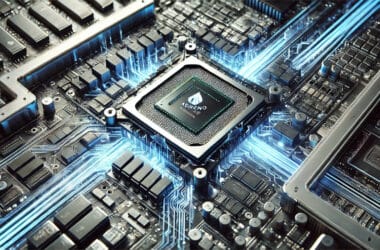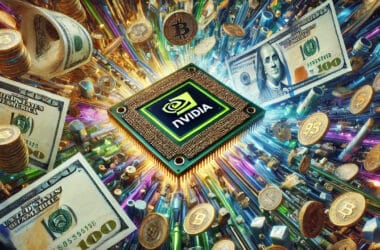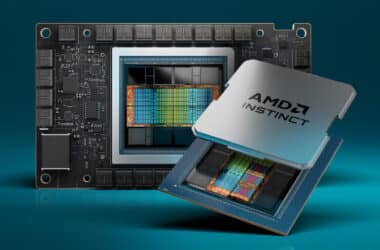The tech world is abuzz with the concept of the “AI PC,” and Microsoft is at the forefront of this exciting revolution. With the upcoming release of Windows 12, which boasts a plethora of AI-based features, the demand for new hardware that can efficiently support these capabilities is on the rise. In this article, we’ll explore the AI PC concept, the implications of Windows 12, and the companies poised to benefit from this tech evolution.
The Rise of the AI PC
Microsoft, a titan in the tech industry, is making significant strides in the realm of artificial intelligence (AI). The buzz surrounding the “AI PC” concept has been growing louder, and Microsoft is leading the charge. The next iteration of the Windows operating system, Windows 12, is set to unleash a wave of AI-driven features. These enhancements are designed to revolutionize the user experience and the capabilities of PCs.
One of the driving factors behind the demand for AI-powered PCs is the impending end of support for Windows 10 in 2025. As Windows 12 ushers in a new era of computing, many organizations and individuals are expected to make the switch and embark on a journey of software and hardware upgrades.
Hardware Requirements for Windows 12
Windows 12 comes with a set of special hardware requirements that older PCs running Windows 10 cannot meet. This shift towards AI-driven computing necessitates a hardware upgrade cycle, complementing the software upgrade cycle. As a result, the release of Windows 12 is not only a significant milestone for Microsoft but also a tremendous opportunity for PC hardware providers.
Leading the charge in the hardware arena are giants like Intel and Advanced Micro Devices (AMD). Both companies have recently unveiled chips with enhanced AI processing capabilities. These chips are well-positioned to meet the demands of the AI-centric Windows 12, driving a surge in demand for new hardware.
Extending the Concept to Smartphones
The AI revolution is not limited to PCs; it extends to smartphones as well. The emergence of “AI smartphones” is set to reshape the smartphone market. Qualcomm, a prominent player in the semiconductor industry, is at the forefront of this transformation. The company has developed “edge AI” capabilities integrated into its mobile chips, promising a new era of AI-driven experiences on smartphones.
As consumers increasingly demand smartphones with enhanced AI capabilities, Qualcomm is poised to capitalize on this trend. The convergence of AI and mobile technology is set to drive sales and solidify Qualcomm’s position in the market.
Microsoft’s AI Initiative
For Microsoft, artificial intelligence has become a central focus under the leadership of CEO Satya Nadella. The company has made substantial investments in OpenAI and has rolled out a range of AI-based applications. Additionally, Microsoft offers AI services through its Azure cloud platform.
This strategic shift towards AI represents a significant pivot for Microsoft. The company’s commitment to harnessing the power of AI underscores the transformative potential of this technology across various industries.
Apple’s AI Strategy
In contrast to Microsoft’s AI push, Apple has been relatively tight-lipped about its AI strategy. Apple typically keeps its research and development efforts under wraps, and its approach to AI has been no exception. While Apple has improved its products’ ability to handle AI workloads, such as through the inclusion of “neural engine” circuits in its chips, there has been limited information about the company’s plans to provide GPT-type services on its platform.
Recent developments suggest that Apple might be lagging behind its competitors in the AI race. Reports indicate that Apple is restructuring its Siri voice assistant AI team, relocating it from San Diego to Austin. This shakeup has raised questions about Apple’s commitment to AI innovation.
The AI PC Revolution: Windows 12, Intel, AMD, and Qualcomm at the Forefront
In summary, the “AI PC” concept represents a paradigm shift in the world of computing, with Microsoft leading the charge with Windows 12. As the tech industry embraces AI-driven solutions, the demand for specialized hardware is on the rise, benefitting companies like Intel and AMD. Additionally, the concept extends to the smartphone market, where Qualcomm is poised to make significant strides with its “edge AI” capabilities.
While Microsoft has wholeheartedly embraced AI, Apple’s AI strategy remains relatively opaque, with recent restructuring efforts in its Siri team raising concerns about its competitiveness in the AI landscape.
In the evolving tech landscape, the intersection of AI and PC technology promises to reshape the way we interact with our devices and the possibilities they offer. As Windows 12 approaches, the tech world eagerly awaits the next wave of innovation and the transformative potential of AI-powered computing.
- Hoth Therapeutics breakthrough! 🧬✨ Why one patient sent Hoth Therapeutics stock forecast soaring by 81% in a single day! - September 8, 2024
- BloomZ Stock Price Just Exploded! Here’s the scoop on their latest alliance and why investors are excited 💥 - September 8, 2024
- The 10-year Treasury rate chart shows a surprising twist… Did hedge funds miscalculate with their record shorts? 🤔 - September 8, 2024
💥 GET OUR LATEST CONTENT IN YOUR RSS FEED READER
We are entirely supported by readers like you. Thank you.🧡
This content is provided for informational purposes only and does not constitute financial, investment, tax or legal advice or a recommendation to buy any security or other financial asset. The content is general in nature and does not reflect any individual’s unique personal circumstances. The above content might not be suitable for your particular circumstances. Before making any financial decisions, you should strongly consider seeking advice from your own financial or investment advisor.










